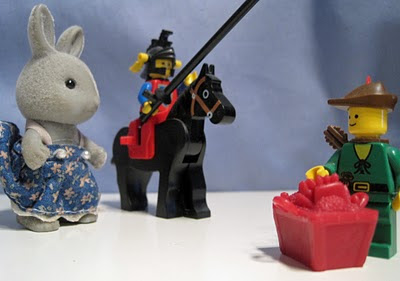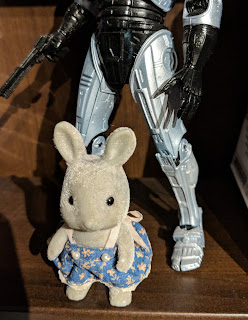Lud-in-the-Mist
(Some spoilerish things included today.)
I don't know quite what I expected when I opened this book, but it was surely not what I got.
I picked up this one for a dual reason: it was reprinted and lauded in the Fantasy Masterworks series, and it was written by a woman in 1926. Worth looking into, I figured.
The synopsis of the premise said that “the law-abiding inhabitants of Lud-in-the-Mist... must contend with the influx of fairy fruit from the bordering Land of Faerie.” So I thought maybe there would be politics, diplomacy, smuggling, etc. I was reading quickly at the time, and I thought maybe they might treat Faerie as a peculiar neighboring country.
No such luck. What I got was a truly strange novel that seems to be about the inadvisability of legislating hallucinogens. Which, whatever you think about the subject, was not quite what I was expecting. It's not badly written, for the most part, although it's front-heavy with tedious exposition. I found it basically unsatisfying.
Part of this is taste: I find the equation of Faerie with the land of the dead less interesting than almost any other literary use of Faerie. And all the interesting characters are not the ones the narration is following, but the main characters are rather generically bluff, pompous, clueless British gentlemen.
It's rather like telling, say, 'Bye Bye Birdie' from solely the parents' perspective. (I'm stuck on this metaphor because about halfway through reading it, I couldn't stop humming "What's the matter with kids these days... " under my breath.) They're adorably clueless about what's going on under their noses, but their day-to-day doings are not the interesting part.
The story centers on the leaders of the town of Lud, capital of a country that borders Faerie, and they have decided, through a complicated legal fiction, that Faerie doesn't exist. Over the course of the story, agents of Faerie are apparently intent on returning the countries to a previous mutual relationship, or possibly just on creating havoc. They lure children away by plying them with said magic hallucinogenic fruit, and generally make trouble. Their motivations are left obscure.
Some of the metaphors are nice, fairly cute. Some of the writing is pleasant and amusing. It just didn't work for me as a whole piece.
And the sun would set, and then our riders could watch the actual process of colour fading from the world. Was that tree still really green, or was it only that they were remembering how a few seconds ago it had been green?
And the nymph whom all travelers pursue and none has ever yet caught – the white high-road, glimmered and beckoned to them through the dusk.
The copy I have is from what seems to be a small press printing, distributed by a larger publisher. It is riddled with severe copyediting problems, and this impaired my enjoyment of the story as well.
I get crotchety when I finish a book with the feeling like I should “get” something about it, but don't. There are multiple possible interpretations of the story. In poking about the internet I found that it's a metaphor for dealing with death, for art, for the danger of delusion, for the futility of war, of prohibition, of the denial of fantasy, of the embrace of fantasy...but none of these really work for me.
The naming of the townspeople as 'Ludites' makes me suspect that the rejection of Fairies should be equivalent to a rejection of technology, but that seems very odd to me. It's almost an inversion of the term; the townspeople are rejecting the “old ways” of communication and commerce with Faerie, and embracing their new ways of human law. Or maybe the name is meant to foreshadow the plot, with the townspeople gradually returning to admiration and respect for the old traditions.
On the other hand, the ending of the book makes me think that the entire thing could be a round about way of equating middle-class bourgeois society with Hell, but Mirrlees spends too much time on how adorable her bumbling merchants are to have that be convincing.
If I have to decode the obscure theme in order to just enjoy the book, that's a problem for me. I like obscure themes, but only on top of an interesting story and characters. The characters here are cute, but shallow, almost ciphers. A satisfying ending could have pulled this together, but all the interesting bits make no sense or happen off-stage. Oh well.
2 Stars - An Okay Book
Next Week: The Coming of Conan the Cimmerian, by Robert E. Howard



Comments
Post a Comment
FYI: Most comments are moderated, and will not appear immediately.